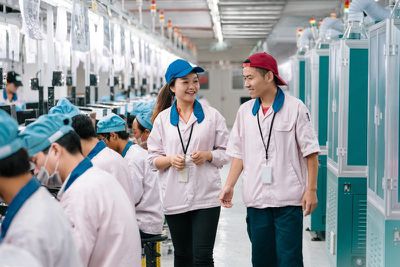Apple today released its 2018 Supplier Responsibility Report, which provides a look into Code of Conduct violations in the Apple supply chain and outlines progress made with new programs promoting health and education awareness.
Apple provides supplier responsibility progress reports on an annual basis in an effort to be transparent about the steps it takes to improve the lives of the employees who manufacture the wide range of Apple products available to consumers.

Apple conducted 756 audits across 30 countries in 2017 (up from 705 last year), and it says that its efforts to raise standards are having a "dramatic impact." The number of low-performing facilities (judged on a point system based on compliance with Apple's Code of Conduct) decreased to one percent during the year, and Apple saw a 35 percent increase in the number of high performers. Overall, Apple suppliers earned an average Labor and Human rights score of 86 out of 100.
Apple did, however, uncover 44 core violations at its supplier facilities, including three bonded-labor violations, 38 working hours falsifications violations, one access restriction violation, and two cases of underage labor. In one incident, Apple says 700 workers in the Philippines paid out a total of $1 million in recruitment fees for factory jobs, which Apple made the supplier pay back. These violations have increased from last year, and Apple says this is because it brought on several new suppliers during the year.
Last year, Apple launched a health awareness program for women at supplier facilities in India and China, which offers access to services and education on self-examination for early cancer detection, nutrition, personal care, and maternal health. Apple says that this program, along with others promoting education and worker rights, has been highly successful.
"We believe that everyone making Apple products deserves to be treated with dignity and respect and we're proud that almost 15 million people understand their workplace rights as a result of the work we've done over the years. We're going further with health education programs and new opportunities for advancement at our suppliers," said Jeff Williams, Apple's COO. "A new preventive health care curriculum is encouraging women to focus on their personal health, and hopefully share that knowledge with their families and communities. Our goal is to reach 1 million women by 2020. We know our work is never done and we're committed to raising the bar every year across our supply chain."
Apple also worked with Beijing Normal University and some of its larger suppliers to introduce a Factory Line Leader Program that offers practical vocational skills, guaranteed internships, and long-term full-time employment opportunities to workers in an effort to recruit more factory line leaders.
Apple says that over the course of the last 10 years, more than 2.5 million supplier employees have taken education classes under its Supplier Employee Education and Development program, and over 12,000 have enrolled for a degree.
As of 2017, all of Apple's final assembly sites around the world have been certified as zero waste to landfill, and suppliers working with Apple introduced energy efficiency improvements that reduced more than on 320,000 annualized metric tons of greenhouse gas emissions during the year.
Additional details about Apple's supply chain and environmental efforts can be read in the full 2018 Supplier Responsibility Report.
Note: Due to the political nature of the discussion regarding this topic, the discussion thread is located in our Politics, Religion, Social Issues forum. All forum members and site visitors are welcome to read and follow the thread, but posting is limited to forum members with at least 100 posts.






















Top Rated Comments
1. The human resources in the US have not been prepped up for factory work like this for a while. It will take a new generation of modifying the school system to prep up new workers that fit for the job, and this won't be overnight.
2. Even after that, it will take several more years for the skillsets of the workers to be up to par. The Chinese have been doing this for decades.
Of course, you can ask Foxconn to setup a factory in the US and bring some initial workforce. But then one would ask, would the education system want to change, and would the people even support this as it won't give jobs to Americans right off the bat. Short answer, nope.